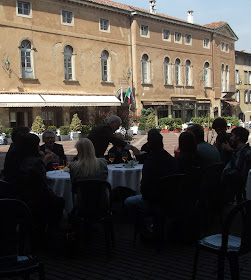 |
| Hotel Excelsior San Marco |
The handy position of the Hotel Excelsior San Marco makes it a good choice for a short break in Bergamo.The four star hotel in Piazza Repubblica is close to the station for the funicular railway that runs back and forth between the città bassa (lower town) and the città alta (upper town). It is also near stops for the number 1 bus service that runs between the città alta and the railway station in the città bassa and Bergamo’s renamed Il Caravaggio International Airport at Orio al Serio.
But it is the unique views that make a stay at the hotel a magical experience, as I discovered during a recent visit.
Guests can linger over the generous buffet breakfast served in the first floor restaurant while looking out towards Bergamo’s 450-year-old city walls, the towers and cupolas of the città alta and the mountains in the distance.
Whether early in the morning when the walled city was softened by mist, or late at night when Porta San Giacomo is lit up in the red, white and green of the tricolore, there was always a marvellous view from the window of my room on the sixth floor.
The Roof Garden Restaurant on the eighth floor -- accessible via a separate entrance next door to the hotel -- also boasts of panoramic views over the citta alta, although it is an expensive option for dinner that I didn't take.
The Hotel Excelsior San Marco is set back from the main street, Via Vittorio Emanuele II, at a comfortable distance from the traffic. Guests have the benefit of smart bars, restaurants and shops nearby in Piazza Repubblica, but Via Sentierone and Porta Nuova in the elegant centre of the città bassa are only a short walk away.
The hotel has 155 rooms, either standard, superior, deluxe or suites, all with satellite television and minibar. There is wi-fi internet connection and also a computer room free for the use of guests. The bar is handily located on the ground floor and there are comfortable settees in the spacious reception area. I found it convenient that the hotel has three lifts so that there was never any time wasted waiting.
The staff were all very helpful, recommending and booking a restaurant and ordering taxis for me during my enjoyable stay.
Book with
Venere or http://uk.hotels.com/ho279542/hotel-excelsior-san-marco-bergamo-italy/














